How to Reach The 100-Year Life With NAD+ (PART III – Balance Methylation)
| | Reading Time: 7 minutes
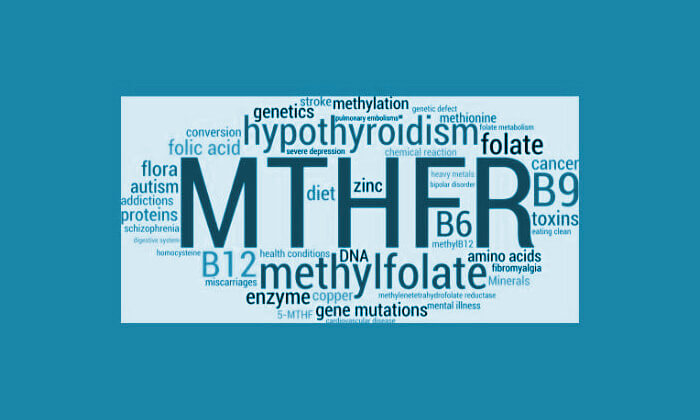
Can NAD+ supplements interfere with methylation pathways? If so, what does that mean for your health? Will you live longer but increase your disease risk? Are there ways to boost NAD+ and support methylation for healthy longevity?
Having enough NAD+ and maintaining methylation are necessary for health, energy, and longevity. Methylation neutralizes hormones, manages neurotransmitters, and plays a key role in energy production and immune function. And, DNA methylation plays a crucial role in aging.
Age-associated DNA methylation is a new field of study. During aging, the genome erodes, and methylation patterns degrade. In some tissue, there is too much methylation and in others not enough. For example, in older people, the immune system is weaker, but autoimmunity becomes more active. As we age, DNA methylation gets reprogrammed by what researchers call the “epigenetic clock.” [1]
Methylation adds methyl groups to DNA, reworking a gene’s function. But not all genes are active all the time. Methylation is one way to control gene expression, turning genes off and on as needed. To prolong your health during aging, the goal is to turn on longevity genes and turn off disease-causing genes.
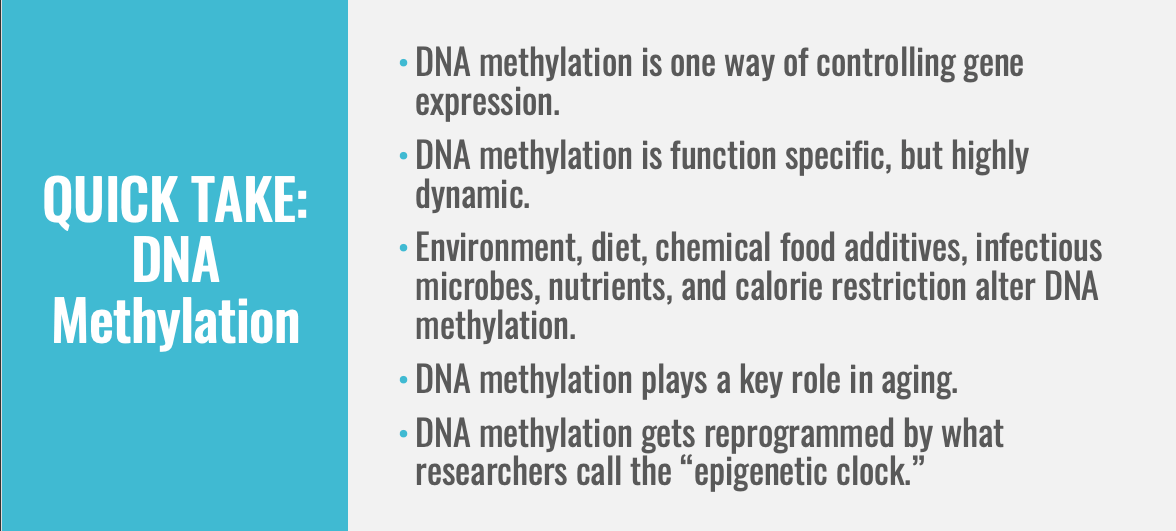
It may be too early to untangle the interconnections between NAD+ supplementation and DNA methylation, but skeptics already question the benefits of high dose NMN and NR. In an interview with Peter Attia, MD, Chris Masterjohn—who has a Ph.D. in nutritional sciences from the University of Connecticut—brought up a concern about overdosing on NAD+ boosters: high doses of NMN or NR can interfere with DNA methylation. [2]
Niacin Is the Building Block for NAD+
In Part I, you’ll recall I wrote that vitamin B3 has three forms: niacin (nicotinic acid), nicotinamide (niacinamide), and nicotinamide riboside; all three become nicotinamide adenine dinucleotide (NAD+) in your body. In Part II, I outlined how to manage NAD+ activity by inhibiting excess CD38 metabolism, the enzyme that modulates NAD+.
In this installment, you’ll find another cellular function limiting NAD+ peak performance. All three forms of B3 become methylated. What’s not used gets removed as waste products.
Researchers measure DNA methylation in urine. Low levels of methylation waste products in a urine test show vitamin B3 deficiency. High levels of these waste products mean too much B3. Likewise, if NAD+ is over metabolized when you take NMN or NR, methylation metabolites end up in the urine. It’s not healthy to take too much niacin. The same by apply to NMN and NR supplements.
Avoid Niacin Overload
Too much niacin has consequences. Excess niacin interferes with glucose metabolism. High dose niacin supplementation can lead to the buildup of uric acid that causes gout. Don’t overdose on niacin if you have a history of liver disease, diabetes, inflammatory bowel disease (IBD), peptic ulcers, gout, or arrhythmia. Though there is not enough evidence yet to know if the same applies to NAD+ boosting supplements, taking lower doses is safer and just as effective.
Overeating meat can cause niacin overload. The Paleogenic low carb, high protein diet may cause B3 overload. Until we know more about NAD+ supplementation, if you eat a high protein diet, keep your NMN or NR supplements to 125 mg or less.
Taking too much niacin or nicotinamide to raise your HDL, the “good” cholesterol can cause DNA damage in the liver.[3] However, it’s more likely that low niacin causes NAD+ deficiency and interferes with cellular metabolism.
MTHFR Mutations Matter but Not Always
Much of what we know of methylenetetrahydrofolate reductase (MTHFR) is based on early genetic research that found a few mutations triggered a range of health concerns. In particular the C677T and A1298C mutations are linked to high homocysteine levels. Doctors worried that these mutations caused cancer and heart disease. But, in the last decade, researchers testing large numbers of people found only 40 percent had MTHFR mutations, most with no adverse health effects.
In my clinical practice, consistent with the new research, I found these common MTHFR mutations are not always linked to cardiovascular, cancer, or neurodegenerative disease. However, if you have these mutations, it’s wise to support methylation because there’s a risk for developing other conditions associated with altered DNA methylation, including rheumatoid arthritis (RA), type II diabetes, and multiple sclerosis (MS).[4]
Clues Found In Common Lab Tests
If you are concerned about DNA methylation, or take high dose NMN or NR supplements, a few laboratory tests give insights into health and disease, and help guide you NAD+ program.
Check your blood count: Too many large red blood cells with a mean corpuscular volume (MCV) above 95 is associated with pernicious anemia with too many large red blood cells. If your MCV is high, you may be deficient in vitamin B6, B12, or folate; nutrients necessary for healthy methylation.
Test your homocysteine. Blood levels of homocysteine get higher when methyl donors are used up. Keep your homocysteine below 9.0 umol/L, preferably lower than 6.0 umol/L.
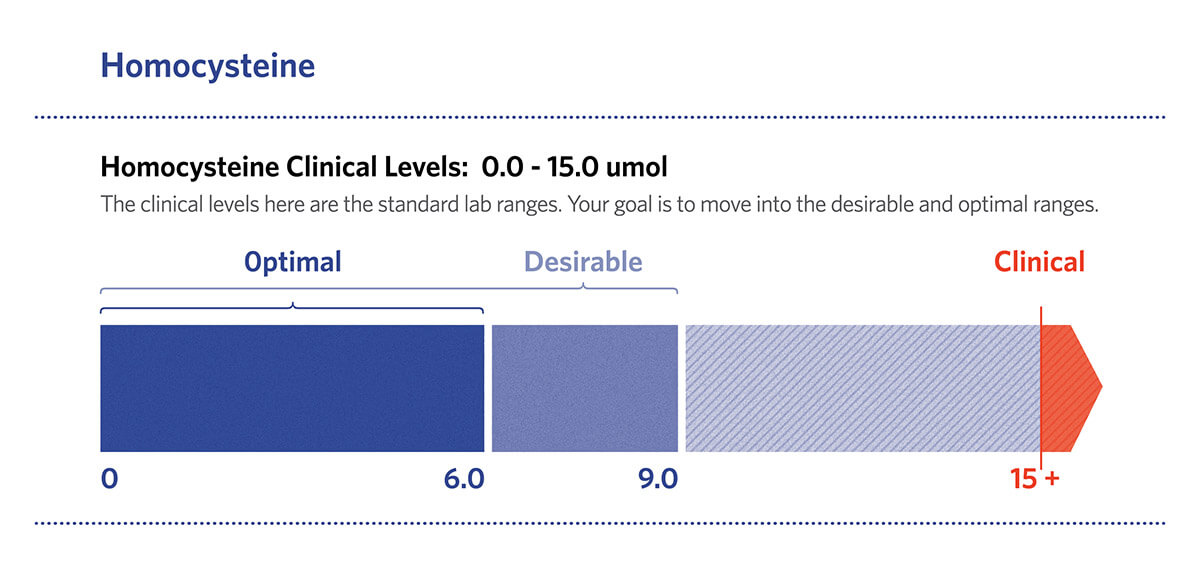
Figure 1: From The Complete Blood Test Blueprint Program
Check your liver functions. Accumulation of fat in the liver may mean you don’t have enough methyl donors. If your aspartate aminotransferase (AST) or alanine aminotransferase (ALT) is high, you have inflammation in your liver and may have a fatty liver. Keep your AST and ALT within the laboratory reference ranges.
Test vitamins B12 (cobalamin) and B6 (pyridoxine). Low or high levels of B12 or B6 are linked to unhealthy methylation. Keep your levels in the upper end of the normal ranges.
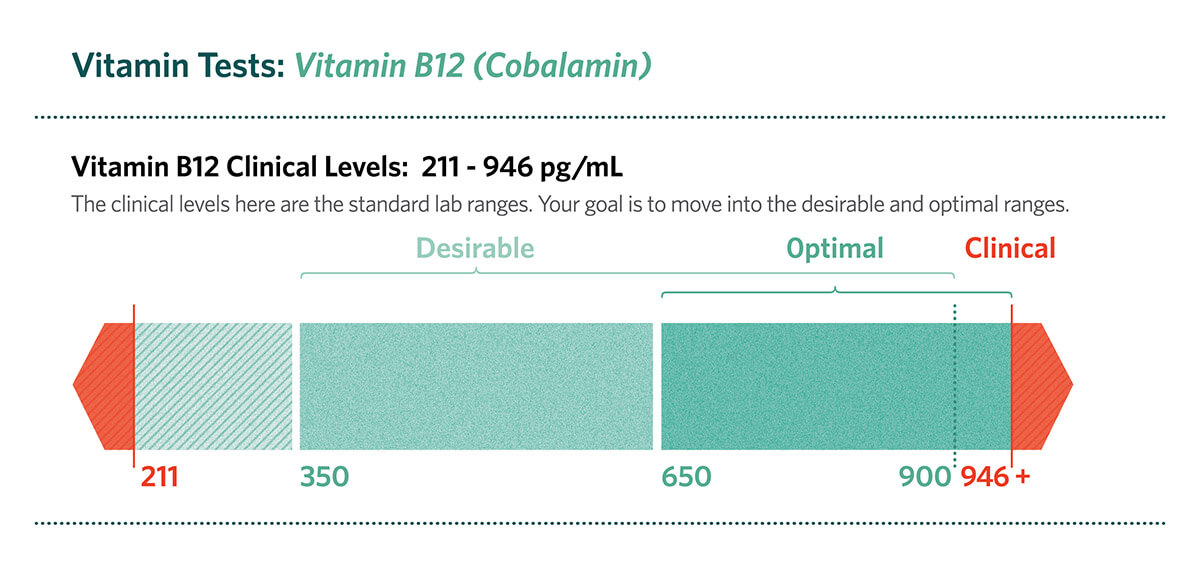
Test for folate. Having enough folate is essential for healthy methylation. Keep your level in the upper end of the reference range.
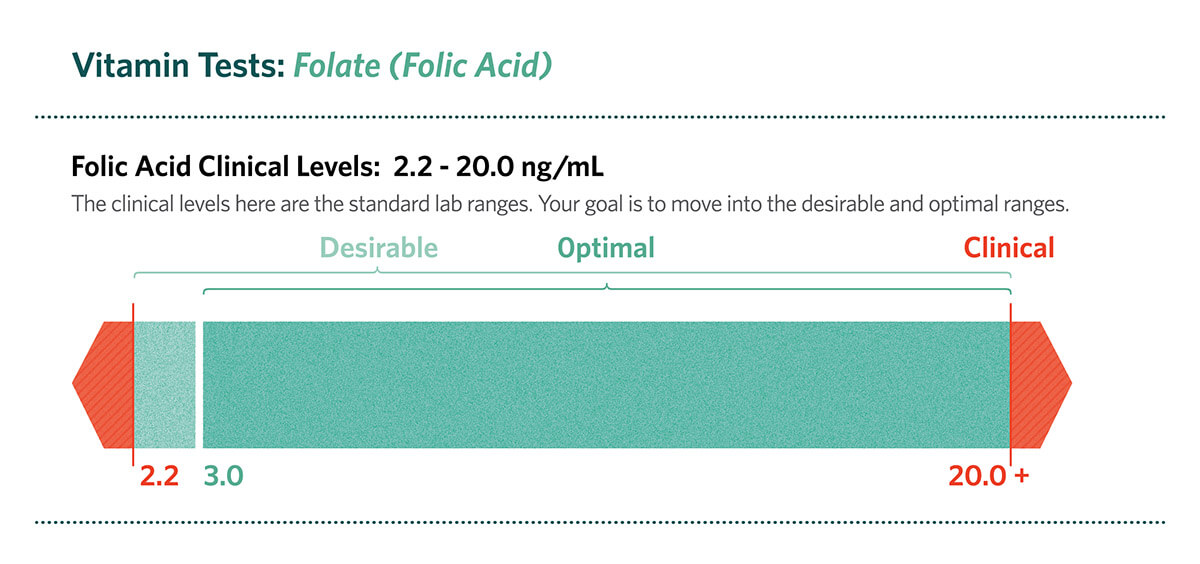
Test for vitamin B3 (nicotinamide and nicotinic acid). Too much B3 is linked to methylation imbalance. Keep your nicotinic acid and nicotinamide levels in the middle to upper end of the normal range.
Test MTHFR DNA analysis for C677T and A1298C mutations. Common methylenetetrahydrofolate reductase (MTHFR) mutations are linked to high homocysteine.
How to Promote Healthy Methylation for Peak NAD+
To compensate for methylation defect take methyl donor supplements. For example, even though up to 70 percent of those with the mutations produce less methylated folate, the “activated” form of folic acid, you can take it as the supplement 5-methyltetrahydrofolate (5-MTHF).
Other methyl donors include methylcobalamin, a form of vitamin B12, and trimethylglycine (TMG), but don’t take too much. And, read labels. A 2015 paper found that energy drinks rich in methionine, betaine, choline, and B12 can disrupt methylation pathways.[5]
Riboflavin (vitamin B2) is an overlooked supplement. It acts as a coenzyme precursor necessary for the metabolism of vitamin B6, B3, and folate. You need riboflavin for healthy MTHFR function.
Supplement Tips to Support Methylation:
- Don’t take megadoses of B vitamins
- Take:
- Niacinamide 500 mg
- 5-MTHF 400 mcg
- Methylcobalamin 1,000 mcg
- Trimethylglycine (TMG) 500 mg
- Riboflavin 5’-monophosphate 5 mg
Is There An NAD+ Diet?
Don’t just take pills. Longevity depends on genetics, disease prevention, exercise, and your diet. Eat a plant-based, balanced diet, and attend to gut health. For example, probiotic bacteria notably Lactobacillus plantarum, can manufacture folate in the gut.[6]
The first step in restoring healthy methylation is to eat lots of green leafy vegetables. Greens are rich in folate. Don’t overeat or avoid red meat. Include methylation superfoods like beets, spinach, mushrooms, and eggs. Balance methylation with polyphenolic-rich foods and spices like turmeric, rosemary, and foods in the cabbage family that contain sulforaphane, as well as heritage tomatoes rich in lycopene.
Take nutritional supplements rich in polyphenols. Manage your coffee consumption. There’s some evidence that too much coffee adversely affects DNA methylation.[7] Green tea beats coffee as a polyphenol superfood with methylation benefits.
Support Your Diet with Polyphenol Supplements:
- Curcumin
- Sulforaphane
- Luteolin
- Lutein
- Lycopene
- Rosmarinic acid
- Green tea extract with 70% epigallocatechin (EGCG)
For NAD+ healthy methylation:
- Avoid energy drinks
- Limit alcohol
- Don’t smoke
- Limit coffee
NAD+ Safety and Effectiveness
A 2018 study found NR supplements safe and without side-effects even at higher dosages. And, they don’t cause the uncomfortable niacin flushing effect. NR and NMN supplementation are effective in stimulating NAD+ metabolism to improve body function and may help maintain healthy blood vessels. The FDA considers NR as generally recognized as safe (GRAS).
Though the molecule was around for decades, oral NAD+ supplements are new. It’s a therapy for the betterment of well people to promote healthy aging. It doesn’t treat a specific disease or condition. It’s meant to improve and sustain normal cellular processes.
The Four Aspects of NAD+ Therapy
Optimal DNA methylation is vital for health and energy at all ages. But for older people, DNA methylation affects their epigenetic clock. That’s why positive methylation and adequate NAD+ levels are essential to prolong health and extend life. But supplementing with high dose NMN and NR may disrupt DNA methylation.
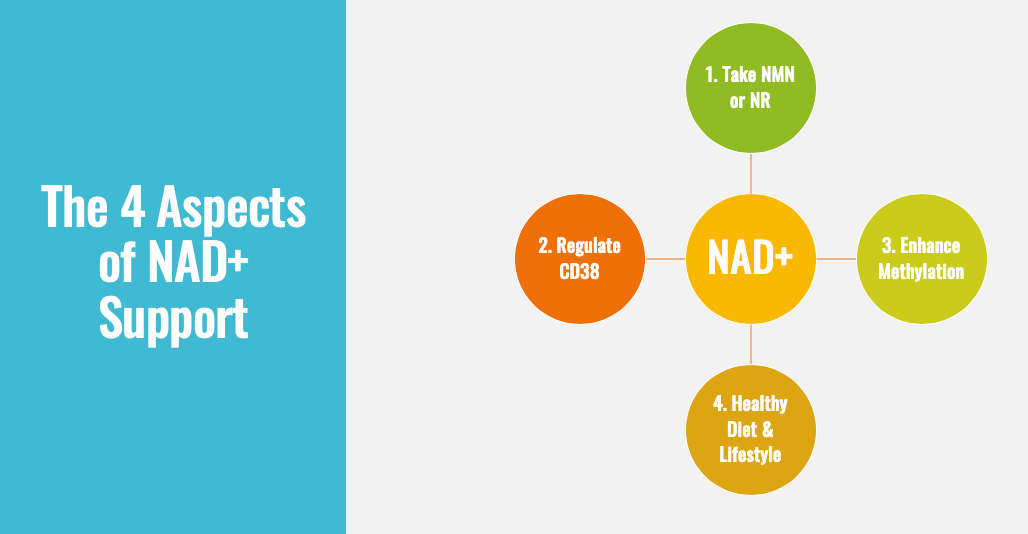
Optimizing NAD+ function is an important therapy to help you achieve the 100-year life. There are four aspects of optimal NAD+ therapy. Take oral NMN or NR supplements. For more intensive therapy, get a course of intravenous NAD+. For a quick boost, take sublingual NADH. Toward optimal NAD+ metabolism, regulate CD38 and enhance DNA methylation. To reach the 100-year life, follow a lifestyle that prolongs your health and improves the quality of life as you age.
The gist of NAD+ supplementation is balance, for that reason: take enough, but not too much. To get the most out of NAD+ boosters, regulate CD38, and support DNA methylation.
LEARN MORE OR INQUIRE ABOUT NAD+ IV THERAPIES
References
[1] Xiao Fu-Hui, Wang Hao-Tian, Kong Qing-Peng. Dynamic DNA Methylation During Aging: A “Prophet” of Age-Related Outcomes. Frontiers in Genetics. Volume 10, 2019. https://www.frontiersin.org/article/10.3389/fgene.2019.00107
[2] Lozoya OA, Martinez-Reyes I, Wang T, Grenet D, Bushel P, et al. (2018) Mitochondrial nicotinamide adenine dinucleotide reduced (NADH) oxidation links the tricarboxylic acid (TCA) cycle with methionine metabolism and nuclear DNA methylation. PLOS Biology 16(4). https://doi.org/10.1371/journal.pbio.2005707
[3] A.C. Williams, D.B. Ramsden. Nicotinamide homeostasis: A xenobiotic pathway that is key to development and degenerative diseases, Medical Hypotheses, Volume 65, Issue 2, 2005, Pages 353-362, ISSN 0306-9877:
https://doi.org/10.1016/j.mehy.2005.01.042.
[4] Jin, Z., & Liu, Y. (2018). DNA methylation in human diseases. Genes & diseases, 5(1), 1–8. doi:10.1016/j.gendis.2018.01.002. https://www.ncbi.nlm.nih.gov/pmc/articles/PMC6147084/
[5] Kimberly R. Shorter, Michael R. Felder, Paul B. Vrana. Consequences of dietary methyl donor supplements: Is more always better? Progress in Biophysics and Molecular Biology, Volume 118, Issues 1–2, 2015, Pages 14-20:
https://doi.org/10.1016/j.pbiomolbio.2015.03.007.
[6] Rossi, M., Amaretti, A., & Raimondi, S. (). Folate production by probiotic bacteria. Nutrients, 3(1), 118–134. doi:10.3390/nu3010118: https://www.ncbi.nlm.nih.gov/pmc/articles/PMC3257725/
[7] Chuang, Y. H., Quach, A., Absher, D., Assimes, T., Horvath, S., & Ritz, B. (2017). Coffee consumption is associated with DNA methylation levels of human blood. European journal of human genetics : EJHG, 25(5), 608–616. doi:10.1038/ejhg.2016.175: https://www.ncbi.nlm.nih.gov/pmc/articles/PMC5437893/

